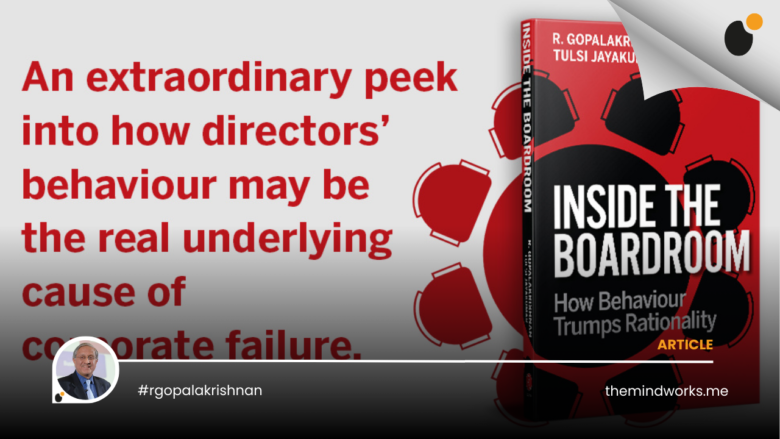BS The Wise Leader (50)
To appear on 9-3-22
What it takes to love a corporation.
By R. Gopalakrishnan*
(rgopal@themindworks.me)
(The writer is a bestselling author and corporate advisor. His latest book, “Pivots For Career Success: Unleashing People Power,” has just been published by Rupa. He was Director, Tata Sons and Vice Chairman, Hindustan Unilever during his career.)
Ideally, corporations should be run so that they acquire respect as well as love from stakeholders. Loving a corporation is not personal; it can be emotional, not necessarily of the physical or familial kind that we have for a family member or a pet.
For example, we connect emotionally with sportspeople. Rafael Nadal, Roger Federer, and Novak Djokovic have all won a record-breaking twenty Grand Slams in tennis, eliciting great admiration. Two of them, however, also arouse a warm emotional response from fans. When Nadal became the first-ever winner of 21 Grand Slams, Federer posted, “To my heartfelt friend and rival, hearty congratulations for being the first man to win 21 Grand Slams…. I am sure you have more achievements ahead, but for this moment, enjoy this one.”
A company earns respect and admiration by consistently delivering on the promises it makes to customers. These emotions transform into love when a company does things that tug at the heartstrings of a community, for example, through socially relevant or humanitarian acts. A wise leader creates a company that is respected, admired, and, most difficult of all, loved.
During my executive years, I asked managers to name five corporations that they respected. Spontaneous responses threw up names that were iconic and highly recognizable. Then I would ask them to name five corporations that they not only respect but also love. Love? How could you love an inanimate entity, some participants argued; a company is a money-making machine, others said. However, corporations can be personified in the minds of customers to the extent that if the corporation runs into unexpected difficulty, unfair controversy or does something heroic, people feel for that company. As the debate progressed, some participants would hesitatingly suggest a few names — Amul? Asian Paints? Bajaj? HDFC? Tata?
Interestingly, the list was short as the group broke through mental barriers. People exhibit love by exulting when something good happens or feeling bad when something bad happens to the company. I cast my mind to events that I have experienced.
After the terror attack in 2008 at the Taj Mahal Hotel, there was a flood of unsolicited letters received at both Tata and Taj. Emotional letters, for instance, about how the writer got married at the Taj, or celebrated a wedding anniversary, or some other life milestone. Some even enclosed cheques to help restore the Taj—small, yes, but touching as a significant expression of love. How much emotional attachment people had for the Taj Mahal Hotel!
Some years ago, I was being driven home by my company chauffeur. On Cuffe Parade, a policeman flagged us down. Apparently, we had jumped a red light at Wodehouse Road. To resolve the dispute, I offered to pay the fine for the alleged infraction. At that stage, the traffic policeman noticed my driver’s epaulet and asked me what work I did in Tata. A hitherto bellicose policeman softened and said, “In that case, I will not fine you.” I was mystified.
Here is the backstory: some five years earlier, the police station at Phaltan Road had not received government raincoats before Mumbai’s torrential monsoon due to a bureaucratic delay. Since the monsoon broke early that year, the cops faced a major problem. A visiting Tata Sons officer, upon learning of this issue, returned to Bombay House and secured 25 new umbrellas for the cops of Phaltan Road. This policeman was so grateful to Tata for this gesture, he said, that he now had the opportunity to express his gratitude. Later, I was able to verify this episode. I was overwhelmed at this spontaneous expression of love for Tata. Who said you cannot love a corporation? It takes just small acts of love and empathy to win hearts, isn’t it?
In 1990, I was posted to the Middle East, so I became especially interested in the region. Iraq invaded Kuwait that year. Many Indians will recall how 170,000 Indians were airlifted by Air India from Kuwait in what is recorded by Guinness Book of Records to be the world’s largest civilian evacuation in history! All this in just eight weeks between 13th August and 11th October 1990 with the stellar guidance of a Kuwait resident, Mathuny Mathews aka Toyota Sunny. People’s spontaneous love for Air India, even if short-lived, resulted in the making of a feature film, Airlift.
There will be a debate among strategists and entrepreneurs about whether Tata Sons has been wise to acquire Air India. This article is not concerned with that subject. After the acquisition by Tata, I posted an allegorical message that “an aunt, earlier young and beautiful, and now old, and who had left the family house 69 years earlier, had returned home.” The message was seen by over half a million viewers with hundreds of responses, expressing delight and best wishes.
A side story—in the late 1880s, Bombay Presidency’s largest textile mill, Dharamsi, was in trouble and put up for auction. Jamsetji won the auction; he struggled for seven years, and to the surprise and delight of many, turned into a roaring success a mill that he had renamed as Swadeshi Mills.
Now, the people of India want their Air India to be efficient and lovable again. The goodwill of 135 crore Indians is a huge intangible asset for the managers who will rejuvenate Air India. Who says that you cannot love a company or its brand?



